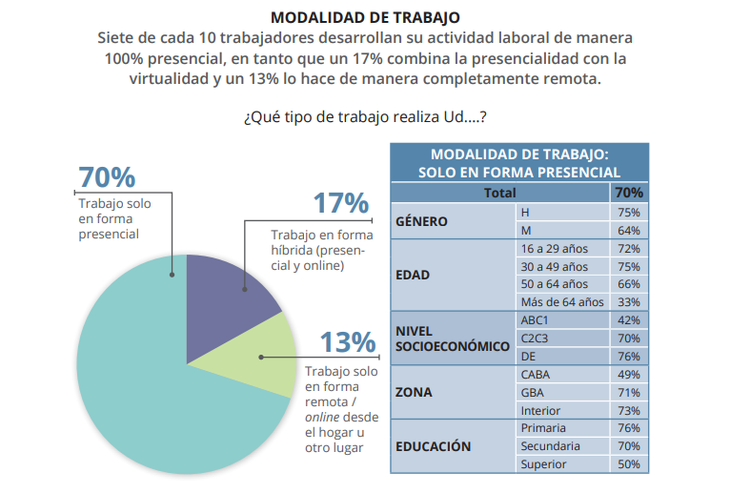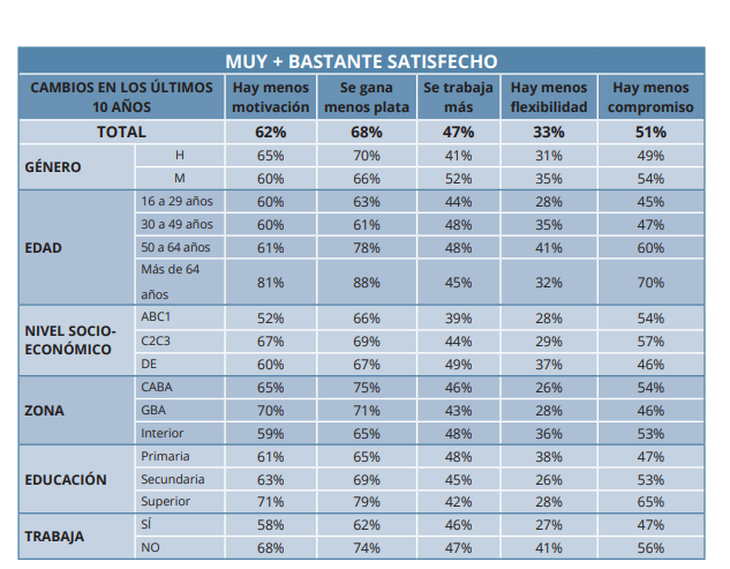The percentage that maintains the presence As a single work format, it is composed mostly of men from 30 to 49 years old.
Seven out of every 10 workers develop their work activity 100% in person, while 17% combine in-person with virtuality and 13% do it remotely. This was revealed in a recent report prepared by UADE and Voices! that sought to analyze changes in the world of work.
The content you want to access is exclusive to subscribers.
Labor market: the main conclusions
- The percentage that maintains the presence As a single work format, it is composed mostly of men from 30 to 49 years old, that belong to a low socioeconomic levelreside in the interior of the country and have primary education.
- 40% of citizens who work remotely maintain the same workloadl compared to in-person. On the other hand, 31% of online workers affirm that their workload is less. While 29% point out that the virtual or remote modality generates a greater workload than in person.
modality.PNG

- 75% of those surveyed expressn high degree of satisfaction with your work situation, while 24% express a medium (16%) or low (8%) level of satisfaction. Within that 75%, people over 50 years of age stand out, with a high socioeconomic level, who reside in the interior of the country and have higher education.
- When comparing the current situation of the country with respect to the last 10 years, the majority of respondents perceive that workers are less motivated (62%), they receive lower salaries (68%), they work more hours (47%), There is less flexibility (33%) and less commitment and identification with work (51%).
Labor market: What would the ideal job be like?
The factor most chosen by citizens, (50%), is the one related to economics: have a good salary or earn well.


In second place was the possibility of progressing (31%), while the Stability ranked third (28%), followed by a job that has contributions, medical coverage or social work (26%). The vocational or pleasant question appears in fifth place: “make it a job that you like to do” was chosen by 25% of those surveyed.
Labor market: the percentage of workers who want to leave the country grows
On the other hand, the survey revealed that 64% of Respondents say they would like to live in another country. This percentage is mainly made up of men between 16 and 29 years old, of high socioeconomic level and residents of CABA.
Spain, 29% is the most chosen country as a destination for those who claim that they would emigrate from Argentina. The United States came in second place, with 15%. And, in third place, Italy was placed, with 11% preference.
More than 7 out of 10 respondents consider that work remotely from Argentina for foreign companies is the best option for young people. While half of those surveyed believe that this phenomenon causes national companies to lose good employees.
• He 81% of those surveyeds states that he would like to work for a foreign company, through the remote modality living in Argentina, while 12% reject this idea. Within that 81%, 60% assure that they would do it to complement a salary income that they already have today. While a 34% would work online for a foreign organization taking into account the compensation for that work as the only salary.
labormarket.PNG

81% of those surveyed affirm that they would like to work for a foreign company
Labor market: what benefits do you value most of working abroad?
He 81% of those surveyeds states that he would like to work for a foreign company, through the remote modality living in Argentina, while 12% reject this idea. Within that 81%, 60% assure that they would do it to complement a salary income that they already have today. Meanwhile, 34% would work online for a foreign organization taking into account the compensation for that work as the only salary.
With the aim of surveying citizen beliefs about the advantages of working remotely for foreign companies, the survey presented a list of possible benefits.
- 47% selected the advantage of charging in dollars
- 45% believe that salaries are better.
- Third, have opportunities for professional development and growth.
Source: Ambito




